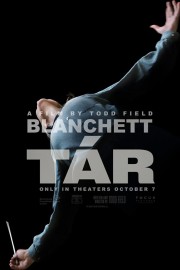Tár
Todd Field does not look at life in simple terms. The parents struggling with the death of their son in “In the Bedroom,” the adults whom are adrift in adulthood in “Little Children” and the conductor attempting to maintain their image in “Tár” are all cut from a similar cloth- they are complex characters whose choices we empathize with, even if we don’t approve of. This is because Field the writer does not write archetypes, but individuals, and as a director, he makes their worlds feel tactile, even if sometimes it appears sterile.
Lydia Tár is a renowned composer-conductor whom is a paragon of greatness on the outside- EGOT winner, acclaimed lecturer, conductor of the Berlin Philharmonic Orchestra- but is calculating and disruptive in how she approaches her life. By the end, she is almost cartoonishly monstrous in how she attacks the controversies she is faced with, and in the end, has to debase herself in a way that would have been unimaginable to her at the beginning of the film.
I find myself almost at a distance with this film, which I did not expect, considering I’ve felt immersed in both of Field’s previous films as I watched them. But there’s something almost unsettlingly cold about the way he brings us into Tár’s world that it’s both off-putting and fascinating at the same time. I find myself thinking about Stanley Kubrick’s “Barry Lyndon” as I begin to really dig into this film, and I have no doubt Field- best known as an actor as the pianist in Kubrick’s “Eyes Wide Shut”- had that film in mind while making “Tár.” Rather than show us the larger story of a life, as Kubrick does Barry, Field focuses in on the period before Lydia is getting ready to complete what might be her masterpiece- the conclusion of recording Mahler’s cycle of 9 symphonies with a live recording of the 5th- and how her life unravels in the preparation for it. It is a riveting experience.
Field wrote the film with Cate Blanchett in mind- is it any wonder she is brilliant in the role? Blanchett is an actor whom invests herself fully in her characters, so of course she learned conducting and how to speak German for the role, in addition to re-learning piano for the moments when she is alone, in an apartment she keeps for herself, composing a new piece of music. The way she plays Lydia is someone who is supremely confident in what they bring to any situation, and who feels like it’s other people’s responsibility to meet her on her level. The arrogance of the character comes through early on, when she is teaching a conducting class, and is working with a student (Max, played by Zethphan D. Smith-Gneist) who does not listen to Bach because of reasons outside of the music. The scene is a fascinating look at not only Lydia’s abrasive nature, but also a fairly straightforward discussion on separating the art from the artist, something that will come into play later for Lydia herself. Ultimately, I think Lydia is correct in her argument, but awful in the way she embarrasses Max in presenting it. That will come back to bite her later, as well.
The women in Lydia’s life are important to the fabric of “Tár.” As we see Lydia getting ready for a discussion about her career in New York, we see two women watching her- her assistant, Francesca Lentini (Noémie Merlant), and a woman whose face we don’t see (Sylvia Flote). That woman is Krista Taylor, a former student of Lydia’s who will play a critical role in her downfall. When she is in Berlin, we see the life Lydia has made for herself with Sharon (Nina Hoss), the orchestra’s principal violin player and concertmaster, and their adopted daughter, Petra (Mila Bogojevic), as well as her rehearsing the orchestra, and auditioning a new cellist, including Olga (Sophie Kauer), whom Lydia finds quite attractive. Krista looms large over Lydia- it has been whispered, and we get impressions, that Lydia groomed her for sexual reasons in exchange for professional favors; Krista rebuffed her, and Lydia has gone out of her way to destroy her promising career. The way Field allows this to unfold without spelling it out is exceptional, and showing us directly the ways Lydia uses Francesca, and looks to groom Olga, is the work of a storyteller who understands innately that it’s better to leave us to make the connections ourselves.
For a film centered around a composer and conductor, the use of music is fascinating. There is a score by Oscar-winner Hildur Guðnadóttir- who is actually named, in film, as one of Tár’s proteges- that is haunting and evocative, but for the most part, what we hear are classical pieces. Bach, Mahler, Elgar are the soundtrack for this film, and I love how Field clearly chose works that are not only great, but also capture the emotional landscape of his film, and it’s main character. I feel like a rewatch will be necessary to really say more about this part of the film.
Field begins with what most films end with- the credits of all of the people that get little of the credit for the success of a film. By doing so, he does something that Lydia seems incapable of doing- showing gratitude. For her, the orchestra, her assistant, even her wife and child, are accessories which allow her to show of her greatness. Gratitude for the way they help her is not in her vocabulary. She’s forgotten some of the most important lessons of her idol, Leonard Bernstein. Whether she’s remembered them by the time she steps in front of an orchestra again is for another story.










